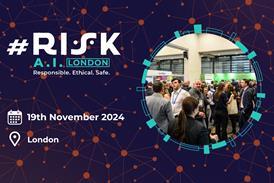All On Demand articles – Page 19
-
 Video
VideoA Gulf to Cross The Middle East’s Race to Comply
According to critics, the past prosperity of some Middle Eastern countries has been supported not only by the flow of oil into the global economy, but by corruption and illicit funds.
-
 Video
VideoIT vs OT: Is There Too Much Operational Technology Online for Hackers?
The attack on the Colonial Pipeline was one of the most major hacks in the history of critical infrastructure. But, this was not a hack on Colonial Pipeline’s IT, but their Operational Technology. The pipeline, which normally carries 2.5m barrels a day, is digital in terms of its operations.
-
 Video
VideoAre you ignoring the elephant in the room - Your Organization’s Data?
Everyone is talking about compliance and fines when it comes to an organization’s data. Fines must not be the driving factor to take control of your data. It must start with Trust.
-
 Video
VideoSchrems II and International Data Transfers: The Journey to a new Privacy Shield and Who Is Leading the Way
Companies are still feeling the impact of the European Court of Justice decision last July that torpedoed the Privacy Shield, raising huge question marks about the future of international data transfers between the EU and US.
-
 Video
VideoWomen and Diversity in Cybersecurity: Why Are We Still Having this Conversation?
Recent research by Tessian found that a higher proportion of young men were likely to consider a career in cyber security than young women.
-
 Video
VideoEnvironmental, Social, and Corporate Governance: Why a Privacy-Focused Company is a Sustainability-Focused Company
Holding less data means less storage, less power usage and this is better for the environment. In short, be lean with data, less power, more profit, better for the environment.
-
 Video
VideoRegulatory Developments: POPIA and the Principles of Enforcement Action
South Africa’s Protection of Personal Information Act (POPIA) comes into enforcement from 1st July 2021.
-
 Video
VideoThird Party Risk Management under GDPR: Ownership and Risks, Fines and Solutions
Data breaches via third parties are a growing problem for GDPR compliance.
-
 Video
VideoData Privacy and Integrated Technologies
The rapid development of new technology presents organisations, regulators and society with data privacy and security risks. In our interconnected world, personal data can be shared between devices, networks and borders rapidly.
-
 Video
VideoEffective Zero Trust: How Zero Trust Can Help Secure Your Business
Zero trust can deliver greater security, less demanding workloads, reduced IT complexity and can be used to improve data protection and user experience.
-
 Video
VideoEngaging Your Line of Business for Cybersecurity Initiatives
Security cannot be done in a silo. The extent and nature of data shared across line of business functions both internally and externally fuels instances of system and organizational vulnerabilities.
-
 Video
VideoGDPR Requirements and Digital Transformation
Digital technology is transforming the way businesses operate around the world and data has never been able to be shared so quickly and easily in real time. However, the General Data Protection Regulation requires data usage to be lawful, fair and transparent, with strict requirements to minimise and limit the purpose of data.
-
 Video
VideoHow to Prevent Credential Stuffing Attacks While Managing Risk and Trust
Credential stuffing is a brute force attack that can be low-risk, high-reward for cyber criminals. This panel will debate the defence techniques that can be used to guard against this threat.
-
 Video
VideoInternal Threats: Top Threats to your IT Security and how to Address Them
From employees accidentally clicking on malicious links, to sabotage, theft of data and unauthorised access, companies have plenty of potential insider cyber security threats to consider.
-
 Video
VideoThe Next Step with RegTech A panel interview with the Napier team
Regulatory Technology (RegTech) for the FinCrime space is now a multi-billion-dollar global industry, and is being promoted by leading regulators as an important new weapon in compliance and risk management.
-
 Video
VideoBiden’s Radical Agenda? Jim Richards on the Implications for the Fight Against FinCrime
The Biden Presidency – less than six months old – has been a surprise to many who expected that the vicissitudes of the past four years and the challenges of the pandemic would lead to a period of stability over change. Instead, President Biden seems to have decided to take a different approach, pushing forward with far-reaching economic policies such as the extensive COVID-19 relief act. As some have suggested, if Biden campaigned as a moderate, he appears eager to govern as a radical.
-
 Video
VideoPushing for the RegTech Revolution Removing the barriers to adoption in FinCrime
In a recent report, the City of London Corporation has argued that the financial services sector needs to leverage new regulatory technologies (RegTech) to meet their obligations and fight financial crime. The report follows a succession of other statements from leading regulators in the US, Europe and Asia-Pacific, all making similar points.
-
 Video
VideoUnited We Stand The potential for integrated FinCrime teams and controls
The problem of fragmentation affects the world of FinCrime in many ways. Within compliance and risk management functions, the past isolation of AML, fraud and sanctions teams has led to key risks falling between the institutional gaps – a problem exacerbated when the teams use different platforms and data streams.
-
 Video
VideoBeyond the Banking Bubble Leveraging technology lessons from other industries
In the last few years, financial services providers and Regulatory Technology (RegTech) firms have talked a great deal about the deployment of new data-driven technologies, usually with a focus on automation and supervised machine learning to core compliance tasks such as sanctions screening and transaction monitoring.
-
 Video
VideoThe Last Lines of Defence - Strengthening the professions’ fight against FinCrime
Most public attention on the private sector’s efforts against FinCrime is devoted to the role of financial institutions, and in particular, banks. This is quite logical, given the centrality of their roles as the gatekeepers of the financial system, and the parts they have unwittingly played in moving illicit funds around the global economy.












